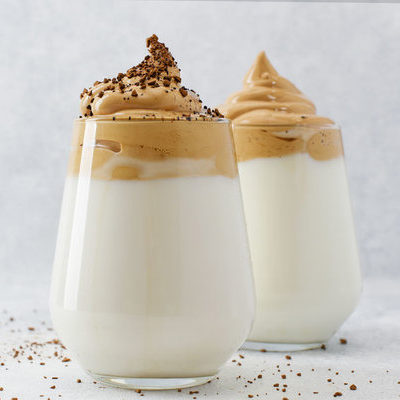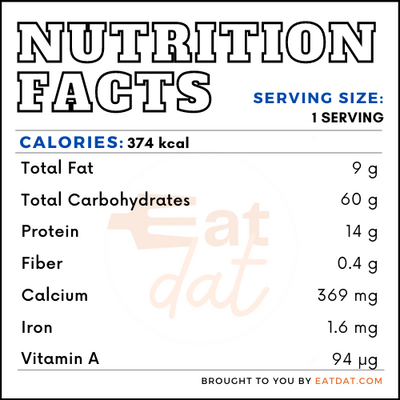
Dalgona Coffee
What is Dalgona Coffee?
Dalgona coffee is a Korean beverage made with instant coffee powder, sugar, hot water, and milk. This coffee can be served hot or cold, depending on taste. The drink may be topped with a variety of different ingredients, including:
- coffee powder
- cocoa
- crumbled biscuits
- vanilla extract
- caramel syrup
- Bailey’s.
This coffee drink went viral on TikTok on the 26th of January in 2020 and became an internet craze overnight. Korean YouTuber J’adore currently has the most popular video of this beverage with 8.2 million views.
Some popular variations of Dalgona include:
- Whipped dalgona chocolate
- Spiced
- Matcha
- Boozy
- Vanilla
- Dalgona milo
Origin of dalgona coffee
This coffee drink comes from Korea or, at least, its name does. The name ‘dalgona’ comes from a sweet that was popular in Korea in the 1950s. Wartime rationing led to a shortage of sweets and people made boiled sugar and water sweets for their children. Dalgona coffee uses the same simple ingredients. A viral video of Korean actor Jung Il-wo ordering the drink in Macau in January 2020 popularized the coffee in the rest of the world. Similar versions of this beverage include frappé (Greece), phenti hui or beaten coffee (India & Pakistan), cappuccino Libyan style (Libya), and café Cubanos (Cuba).
Nutrition
One serving of dalgona coffee contains:

Caffeine may also be able to protect against mental illnesses, such as dementia and Alzheimer’s. Overconsumption of caffeine may lead to heart problems, as well as palpitations, high blood pressure, irregular heart rate, or heart attacks. The sugar in the coffee also provides energy and can improve brain function. However, overconsumption of sugar can lead to an increase in the risk of heart disease, diabetes, cancer, as well as obesity, depression, and aging.
The milk in this beverage provides calcium, vitamins B12 & D, and potassium. These nutrients help in keeping bones strong, regulating blood pressure, as well as digestive functions. Milk also contains folate, thiamine, riboflavin, phosphorus, as well as proteins, complex carbohydrates, and fats. However, about 65% of the human race is lactose intolerant, which means this beverage may not be suitable for everyone. Dalgona coffee, if consumed in moderation, makes a satisfying and refreshing drink.
Commercial production
Dalgona coffee is made by mixing coffee powder, sugar, and hot water in a 1:1:1 ratio and blending them thoroughly. Once these ingredients are blended, the milk is heated separately. The warm milk is then poured into a glass and the whipped coffee mixture is added on top of it. Finally, the beverage is decorated and served. Dalgona coffee may also be stored for about a week in the fridge if it is stored in an airtight container.
Dalgona coffee recipes
This coffee can be served as a beverage, as well as a dessert. Here are a few recipes:
- Dalgona Coffee
- Peanut Butter Dalgona
- Vanilla Cinnamon Whipped Coffee
- Dalgona Matcha Latte
- Dalgona Whipped Chocolate
- Dalgona Espresso Brownies
- Dalgona Chocolate Cake
FDA regulations
The main ingredients in dalgona coffee are milk, sugar, and instant coffee. The FDA regulates milk and defines it as the lacteal secretion from the milking of healthy cows and should be free of colostrum. Packaged milk must be pasteurized and shall not contain less than 8¼ percent milk solids. Sugar is also regulated by the FDA and is obtained from the crystallization of sugar cane or sugar beet juice that has been extracted by pressing or diffusion, then clarified and evaporated. However, it is the USDA that regulates the production of coffee beans. Some aspects of the processing of coffee beans may come under the purview of FDA regulations.
References
Nickolaus Hines, The true origin of the internet-famous dalgona coffee, Matador Network
https://matadornetwork.com/read/dalgona-coffee-origin/
Scott Edwards, Sugar and the Brain, Harvard Mahoney Neuroscience Institute, Harvard Medical School
https://neuro.hms.harvard.edu/harvard-mahoney-neuroscience-institute/brain-newsletter/and-brain/sugar-and-brain
Caffeine and Heart Disease, Heart.org
https://www.heart.org/en/healthy-living/healthy-eating/eat-smart/nutrition-basics/caffeine-and-heart-disease
